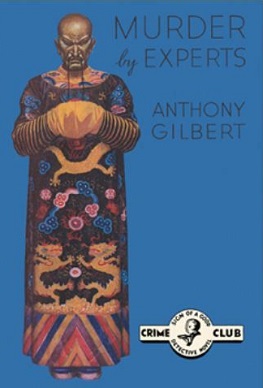
Murder by Experts is a 1936 mystery thriller novel by the British writer Anthony Gilbert, the pen name of Lucy Beatrice Malleson. It launched her long-running series featuring the shady London lawyer and detective Arthur Crook. Although she had been writing since 1926 this was her first major popular success. The plot revolves around collectors of Chinese antiques.

The Echoing Strangers is a 1952 mystery detective novel by the British writer Gladys Mitchell. It is the twenty fifth entry in her long-running series featuring the psychoanalyst and amateur detective Mrs Bradley.
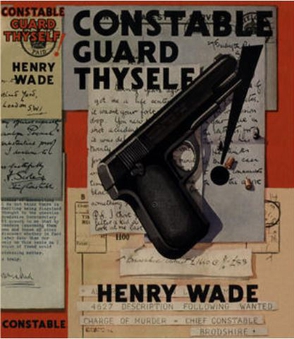
Constable Guard Thyself is a 1934 mystery detective novel by the British writer Henry Wade. It was the third in a series of seven novels featuring the character of Chief Inspector Poole, although it was preceded by the 1933 short story collection Policeman's Lot in which seven of the twelve stories had featured Poole. After his more experimental novel Mist on the Saltings Wade returned to the traditional detective model.

The Verdict of You All is a 1926 mystery detective novel by the British writer Henry Wade, his debut novel. Both this and his following novel The Missing Partners revolve around potential miscarriages of justice. It was published in the United States by Payson and Clarke in 1927. A success it launched his career as one of the prominent writers during the Golden Age of Detective Fiction. The title refers to the traditional question asked in court by a judge of the jury to establish whether they have reached a unanimous verdict.

The Man Who Grew Tomatoes is a 1959 mystery detective novel by the British writer Gladys Mitchell. It is the thirty second in the long-running series of books featuring Mitchell's best known creation, the psychoanalyst and amateur detective Mrs Bradley.

The Twenty-Third Man is a 1957 mystery detective novel by the British writer Gladys Mitchell. It is the thirtieth in the long-running series of books featuring Mitchell's best known creation, the psychoanalyst and amateur detective Mrs Bradley.

Be Kind to the Killer is a 1952 detective novel by the British writer Henry Wade. As with many of his works it is written in the style of a police procedural.

The Tragedy at Freyne is a 1927 mystery detective novel by Anthony Gilbert, the pen name of British writer Lucy Beatrice Malleson, her first novel under the pseudonym. It introduced the amateur detective Scott Egerton, who was her principal character until the creation of Arthur Crook in Murder by Experts.
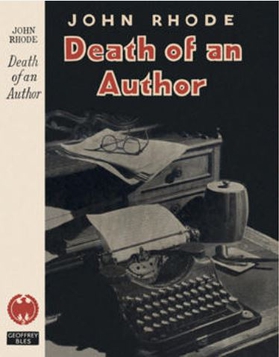
Death of an Author is a 1947 detective novel by John Rhode, the pen name of the British writer Cecil Street. It is the forty fifth in his long-running series of novels featuring Lancelot Priestley, a Golden Age armchair detective. The New Yorker described it as "Rather pleasant, in a ponderous fashion" while Will Cuppy, writing in the New York Herald Tribune, felt "Mr. Rhode provides one of those satisfying British stories in the old tradition, full of mystery meat and brain-work."

Nothing But the Truth is a 1947 detective novel by John Rhode, the pen name of the British writer Cecil Street. It is the forty fourth in his long-running series of novels featuring Lancelot Priestley, a Golden Age armchair detective.
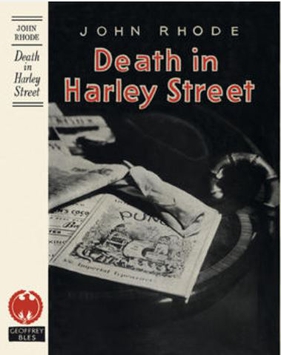
Death in Harley Street is a 1946 detective novel by John Rhode, the pen name of the British writer Cecil Street. It is the forty third in his long-running series of novels featuring Lancelot Priestley, a Golden Age armchair detective. Several sources consider it to be the author's masterpiece.

Up the Garden Path is a 1949 detective novel by John Rhode, the pen name of the British writer Cecil Street. It is the forty ninth in his long-running series of novels featuring Lancelot Priestley, a Golden Age armchair detective. It was published in America by Dodd Mead under the alternative title The Fatal Garden. Reviewing the novel in The Observer, Maurice Richardson concluded "Mr. Rhode has lost very little of his grip."

The Paper Bag is a 1948 detective novel by John Rhode, the pen name of the British writer Cecil Street. It is the forty sixth in his long-running series of novels featuring Lancelot Priestley, a Golden Age armchair detective. It was published in America by Dodd Mead under the alternative title The Links in the Chain.

The Two Graphs is a 1950 detective novel by John Rhode, the pen name of the British writer Cecil Street. It is the fiftieth in his long-running series of novels featuring Lancelot Priestley, a Golden Age armchair detective. It was published in America by Dodd Mead under the alternative title Double Identities. Writing in The Observer Maurice Richardson noted a "slight slackening of tension towards the finish but an excellent specimen of Rhode’s later period."

The Telephone Call is a 1948 detective novel by John Rhode, the pen name of the British writer Cecil Street. It is the forty-seventh in his long-running series of novels featuring Lancelot Priestley, a Golden Age armchair detective. It was published in America by Dodd Mead under the alternative title Shadow of an Alibi. It is based on the real-life Wallace Case of 1931 in which William Herbert Wallace was convicted of murdering his wife Julia, a conviction which was later overturned on appeal.
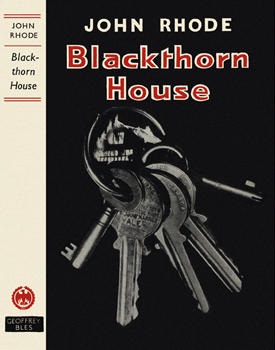
Blackthorn House is a 1949 detective novel by John Rhode, the pen name of the British writer Cecil Street. It is the forty eighth in his long-running series of novels featuring Lancelot Priestley, a Golden Age armchair detective.

Night Exercise is a 1942 detective novel by John Rhode, the pen name of the British writer Cecil Street. It is a stand-alone wartime novel from Rhode, best known for his long-running series featuring Lancelot Priestley. It was published in America by Dodd Mead under the alternative title Dead of the Night.
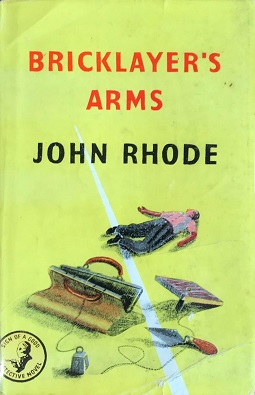
Bricklayer's Arms is a 1945 detective novel by John Rhode, the pen name of the British writer Cecil Street. It is the forty first in his long-running series of novels featuring Lancelot Priestley, a Golden Age armchair detective. It was published in America by Dodd Mead under the alternative title Shadow of a Crime. It was particularly notable for the lesser role played by Priestley, with the case being solved largely by Inspector Waghorn of Scotland Yard alone.

They Watched by Night is a 1941 detective novel by John Rhode, the pen name of the British writer Cecil Street. It is the thirty fifth in his long-running series of novels featuring Lancelot Priestley, a Golden Age armchair detective. It was published in the United States by Dodd Mead with the alternative title Signal for Death.

One of Those Ways is a 1929 romantic mystery crime novel by the British writer Marie Belloc Lowndes. It marked the return of Hercules Popeau, a French detective character first introduced in The Lonely House, who appears in the second half of the novel. The title is a quote from The Pilgrim's Progress "Now the name of one of those ways was Danger".




















